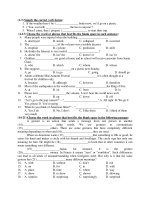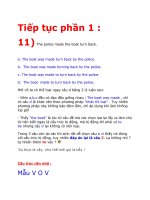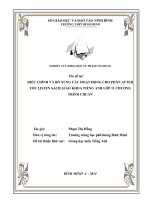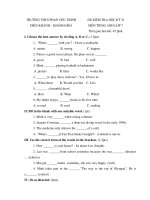- Trang chủ >>
- Văn Mẫu >>
- Văn Bản Mẫu
tieng anh 2 phan ngheGiao trinh DHCT
Bạn đang xem bản rút gọn của tài liệu. Xem và tải ngay bản đầy đủ của tài liệu tại đây (80.92 KB, 4 trang )
<span class='text_page_counter'>(1)</span>Unit 1: Bamboo bridges Track 2 Listen to the first part of the conversation between Mark and Hung. Circle the correct answer for each of the following questions Track 2 Mark: Hi Hung! How are you? Hung: Oh hello, Mark. I’m fine thanks. Where are you going? Mark: Nowhere. I’m just riding around the campus for exercise. What about you? Hung: I’m on my way to the dorm. I have an appointment with my classmates for our group work. Do you cycle every Sunday Mark? Mark: Well, almost every Sunday. You know sometimes some of my students invite me to their houses in the countryside, so I go with them and have no time for cycling. Hung: That sounds great. Have you been to many places? Mark: almost all the twelve provinces in the Mekong Delta, except Camau, Hau Giang and Dong Thap I guess. Hung: Really? Dong Thap is my hometown. So, what about coming to my family someday. Mark: I’d love to. Is it very far from here……………. Listen to the second part of their conversation and complete the table below (track 3) Hung: It’s not too far I think, about 60 kilometers. We can go there by motorcycle if you dare. Mark: Of course I do. Does your family live in the center of the town – Let’s say Cao Lanh, right? Hung: No. We live in a small village in the countryside. Mark: I see. So how far is it to the town center? Hung: Not more than three kilometers I think. Mark: What is the neighborhood like? Hung: I would say very peaceful and relaxing. Mark: And who is living there? Hung: My parents with two younger sisters. We have got a small but lovely house and a fruit garden there. Mark: So, your parents are gardeners, aren’t they? Hung: Well, my dad is, my mom is a housewife. However, sometimes she can help him with his gardening like picking the fruit. Mark: How interesting. What kinds of fruit does he grow? Hung: We have many I think – longans, durians, mangos, bananas and pomelos. Mark: Wow, all of them are my favorite except durian. I cannot stand the strong smell. Hung: I know. Even many Vietnamese people sometimes cannot stand it too. So, when should we go there? Is next Sunday ok for you? Mark: That’s perfect I think. I will finish all my classes this week, and I will skip my cycling exercise again next Sunday. Hung: Sounds great to me. I’ll call and we will talk about our plan for it this evening. See you. Mark: See you and enjoy the group work.. Unit 2: “When in Countryside, Do as Village People Do” 2. Listen to Ming Lee, from Japan talking about Japanese Etiquette. Listen and tick the points he mentions (Track 8) In Japan, you should wear appropriate clothes for business and when you visit temples, you must wear conservatively because these are considered holy places The most popular way of greeting in Japan is bowing. It can range from a nod to a 90 degree full-body bow, depending on the status of the person you greet. Also, when you visit someone’s house, you must take your shoes off before entering the house. The host will give you a pair of slippers when you enter. If you give a gift, you should give with both hands, and when you receive a gift, you should not open right away in front of the giver. Remember don’t visit someone’s house without a gift because it is considered to be rude.Pointing at people, I think it is the same everywhere. It is a rude behavior, so you must not do that. Same in Japan.Kissing in public is very rare in Japan and only young people do that, so I think you should not kiss in public in Japan..
<span class='text_page_counter'>(2)</span> Unit 3: Festive Season, Festive Mood 3. You will hear about holidays in three different countries around the world. Where and when is each holiday celebrated? Listen and complete the information 1. Mid- Autumn Festival (Track 12) Mid-Autumn festival is a traditional holiday in Vietnam, which is celebrated in the middle of the eighth lunar month. That’s when the moon is full. This holiday is originally for children and today it is generally the holiday for everyone. On this day, people often get together for tea and adults often tell stories to children. Children are very happy with their lanterns on their hands, singing and dancing together. The traditional cake is called “Moon cake”, which is considered as the symbol of this day. 2. New Year’s Day New Year’s Day in Thailand is called Shongkran, is from April 13th to April 15th. It is the chance for visiting family members, especially the elderly, friends and neighbours. People also go to pagoda (which is known as Wat) to pray. However, the most interesting part is the tradition of throwing water. People gather on the street with water and they throw water into each other for good luck of the new year. 3. Thanksgiving Thanksgiving Day is celebrated on the 4th Thursday in November. This is considered as a harvest festival. In the United States, people often have a big family meal with turkey and maybe smashed potatoes. You know most people don’t work the Friday after Thanksgiving, so it’s a long four-day weekend. Well, Thanksgiving is my favourite holiday. 4. Two people are talking about their favorite holidays. Listen and fill in each blank with a correct word Track 13 One: Mother’s Day is an annual holiday that recognizes mothers, motherhood and maternal bonds in general, as well as the positive contributions that they make to society. In Canada and the United States, it is celebrated on the second Sunday in May. Mother’s Day was established by Anna Marie Jarvis, following the death of her mother on May 9, 1914. There is a custom of wearing a special kind of flower, the carnation on Mother’s Day. The founder, Anna Jarvis, chose the carnation because it was the favorite flower of her mother. I love this day because of its meaning. I mean it’s a day when every one can express her feeling and love to her mother. Two: My favorite holiday is our New Year Holiday which is called Tet. This holiday actually begins about a week before the main day. We decorate our houses, go shopping and prepare traditional kinds of food. On the first day of the new year, we often visit our grandparents, parents or relatives and wish each other health and luck in the new year. Children often get lucky money in red envelopes. Many people also go to pagodas for praying. Unit 4: Hurry Up! Task 1 1. Person 1: *(Track 16) Let me see. Ok, you are now on ELM Street. Just go straight on to the crossroads. Continue going straight at the crosswords until you see a junction. It’s just right at the corner between ELM Street and Twelfth Avenue, on the right. 2. Person 2: Well, let’s see. First go straight ahead to the crosswords. Turn left at the crossroad into Eleventh Avenue. Then go straight on to the end of the avenue. It is on your left. You will go past the library on your way there. 3. Person 3: Now go straight ahead to the crosswords. Turn left at the crossroads into Eleventh Avenue. Go straight ahead on Eleventh Avenue. Go straight ahead on Eleventh Avenue until you see a park on your right. Turn left at the junction just opposite the Park. Let me see. Now you are on Oak Street. Just continue straight ahead until you see another junction. It’s right at the corner between Oak Street and Twelfth Avenue, on your left. It’s opposite a department store I think 4. Person 4: Oh, it’s not very far from here. First just go straight ahead to the crossroads. Turn right and go straight on Eleventh Avenue. When you see a junction, keep going straight. It’s just.
<span class='text_page_counter'>(3)</span> right after the junction on your left. It’s opposite the park. It’s very easy to find. You can’t miss it. Task 2. Hai and Andrew are talking about what they like about their cities. Who is saying what? Listen and tick the correct colum (track17) Hai: I come from a city called Cantho, in the South of Vietnam. It is known as the center of the area, but it’s still small if you compare to big cities like Ho Chi Minh City. I love my city because it seems to be peaceful and safe to me. It is not so crowded as Ho Chi Minh City. Also, the traffic is great here, I mean private means of transport. Although public means of transport such as bus and taxis are not very popular here, the streets are very wide and so I always feel I have a lot of space for moving around. The best thing about the city is that it is developing very fast, so you can see the city grow up everyday. Oh, and there are so many nice cafes with beautiful views that make the city more special. Andrew: My name is Andrew. I come from Sydney in Australia. I’m proud of my city for many things. Interesting art museums are the first things come to mind. It is also well-known for the largest harbor in the world. Then, the public transport system here is so great and easy to use. You know, people also say that Sydney is a good place to see koalas and kangaroos, especially at Taronga Zoo. However, the best part of it is that its people are really friendly and helpful. Unit 5: The Mass Exodus 1. ( Track 20) Kevin: Hello Kevin’s speaking. Mom: Hi Kevin. This is mom. How are you? And how is everything there? Kevin: Hi mom? How are you? Everything is good with me. Is everything ok back home? Mom: Yes, everything is fine except that…we don’t have you here and we feel like it is so quiet. Kevin: Come on mom. It’s already three months since I moved to live here for my study. Time will fly and I will be back soon. Mom: I know, but your dad and I feel worried for you then. Kevin: Come on, I am already 18 years old. I think I like it here a lot. You know the exciting atmosphere through people are not so friendly as those in our hometown. Mom: I know you are grown up now. But I read on the newspaper last week about crime in the city and both your dad and I felt very worried. Kevin: Mom, I am always very careful. Please don’t worry. You know it is just the heavy traffic, the noise and pollution here that makes me feel tired sometimes. Other than that, everything is ok to me. Mom: That’s good then. And everything is ok with your study? Kevin: It is mom. I have better conditions for my study here. You know the university has the learning resource center where I can find almost everything I need for my study. I am sure I will have good results for this semester. Mom: I am happy to hear that. Ok, take a good care and phone home more frequently. Good night dear. Kevin: Good night mom. 2. Track 21 Prof: Good morning class. Last week we discussed a lot of environment problems that we are facing: water, air and noise pollution, garbage floating on the river, too much traffic, hot weather and not much open space in cities. Today, I want to continue with the problem of traffic jam in big cities. As you know many big cities today are facing serious problem in moving around. This causes a lot of waste and damage to our society. I want you all to think of some possible solutions that can help limit the traffic in big cities. SA: I think what we really should do now is to improve the public transportation and encourage people to use it instead of their private means of transport. Pro: That’s a very good idea. Any other opinions? SB: I think we should specifically talk about improving the bus service here. You know today people complain a lot about the quality of buses in this city. SC: That’s right. And more thing we can do is to ban cars that go into downtown areas during rush hours. Maybe we can also build more lanes for bicycles or pedestrians and encourage people to walk or ride bicycles more..
<span class='text_page_counter'>(4)</span> Prof:. There are very excellent ideas. Now I want you to read the article written by an expert in sustainable development and get more ideas on how to improve the traffic in big cities, … Unit 6: Tragedies 5. Three people are talking about what they do to keep themselves safe. Listen and tick off the correct columns. (Track 25) Speaker 1: Well, I am living in a boarding house downtown. I have to say that I feel very safe here, but I still need to take precaution. In my room, I have locks on both the door and the windows and I always lock them carefully when I go out. Also, I always come home before 10 p.m even when I go to parties. And whenever I go back home to visit my parents in the countryside, I always ask my neighbors to keep an eye on my house. Speaker 2: Well, I am sharing a room with my classmate. It is a nice place and rather safe. However, to be safe, I always tell my roommate exactly where I am going so that she can know where I am at all time. Also I never go out alone at night. In addition, when I come home at night, I always have my keys ready at the front door so that I don’t have to stop and look for them. Speaker 3: I think the most important thing we should do to protect ourselves is not to bring a lot of money and wear a lot of jewelry when going. This will certainty catch the attention of others. Also remember that we should not talk to strangers to make sure they do not have changes to contact us. 5. You are hearing to hear Nam, a second-year student talking about the time when his bicycle was stolen and what lesson he could learn from it. Listen and complete the table below. Well, it happened when I was first year student. Exactly, it was the second week I stayed in Cantho city. I came from the countryside, so I was very timid and seldom went out. However, that weekend, I did not go back home to visit my parents and one of my roommates invited me to join him for a football match. I had nothing to do, so I agreed immediately. When we got to the stadium, there were so many students there, males and females. We had some time to change our clothes and I told my friend that I wanted to send my bicycle to the parking lot, but he said it was ok and he asked one of his classmates to keep an eye on it. So I left my bike there, just right outside the playground. Then we started to play, and it was just about 5 minutes after that I looked out and I could not believe my eyes. My bike disappeared. I shouted loudly that my bike was stolen and many people at the stadium started to run around the campus to look for it but nobody can see a clue of it. Finally I went home and called my family to inform them the bad news. I felt so disappointed and a bit angry at myself for my carelessness. That was also the time I learnt to be more careful with everything. Since then, I have always sent my bicycle in the parking lot..
<span class='text_page_counter'>(5)</span>









